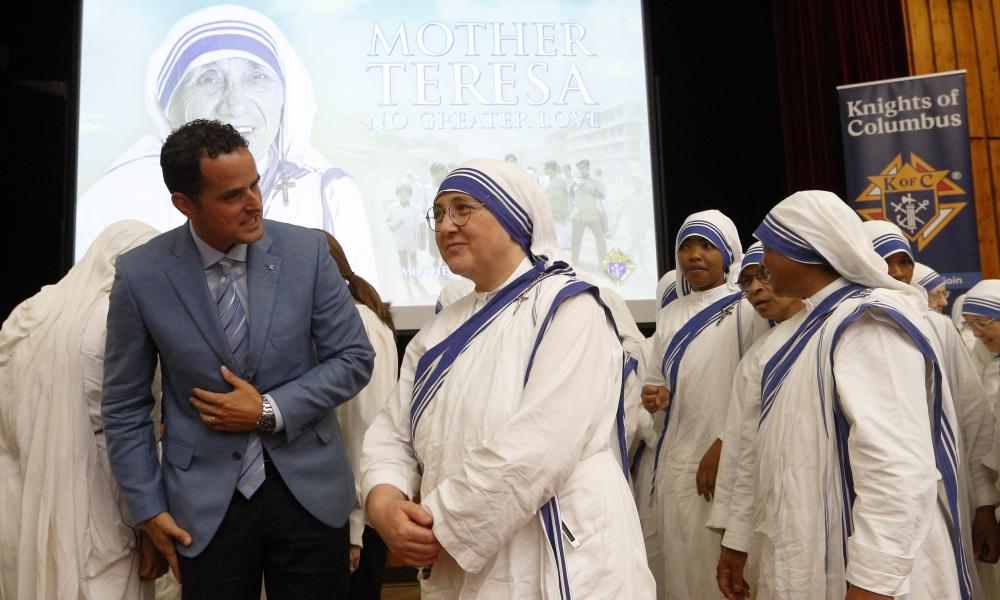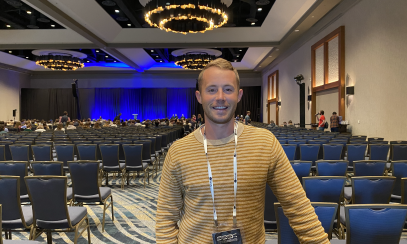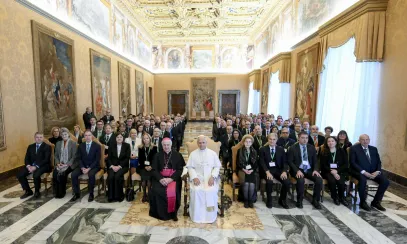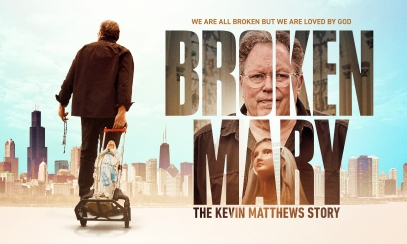
How New Mother Teresa Documentary Sheds New Light on a Beloved Saint
Tickets are on sale now for MOTHER TERESA:NO GREATER LOVE, a documentary produced by the Knights of Columbus that tells the inspirational story of one of the world’s most revered saints, Mother Teresa of Calcutta. The film will be released in select theaters nationwide Monday, October 3, and Tuesday, October 4, 2022
Tickets are on sale now for MOTHER TERESA:NO GREATER LOVE, a documentary produced by the Knights of Columbus that tells the inspirational story of one of the world’s most revered saints, Mother Teresa of Calcutta. The film will be released in select theaters nationwide Monday, October 3, and Tuesday, October 4, 2022
Caption: Filmmaker David Naglieri talks with a Missionaries of Charity nun after a private screening of the documentary film, "Mother Teresa: No Greater Love," at the Knights of Columbus' Campo Pio XI in Rome Sept. 1, 2022. Produced by the Knights of Columbus, the film will be released in more than 900 theaters Oct. 3 and 4. (CNS photo/Paul Haring)
Caption: Filmmaker David Naglieri talks with a Missionaries of Charity nun after a private screening of the documentary film, "Mother Teresa: No Greater Love," at the Knights of Columbus' Campo Pio XI in Rome Sept. 1, 2022. Produced by the Knights of Columbus, the film will be released in more than 900 theaters Oct. 3 and 4. (CNS photo/Paul Haring)
September 6, 2022 | CNA - The so-called “definitive movie” about Mother Teresa of Calcutta will be in theaters in October. It sheds new light on — and delivers powerful images of — the life of this venerated Albanian-Kosovar nun.
Sept. 5 is the feast day of the St. Teresa of Kolkata. She died on Sept. 5, 1997, and was beatified by Pope John Paul II only six years later, on Oct. 19, 2003.
Her life inspired thousands of books. Her life, witness, and legacy have been studied and written about in depth.
Pope Francis canonized Mother Teresa on Sept. 4, 2016.
For this reason, it doesn’t seem easy to add anything to the many biographies and stories about Mother Teresa of Calcutta. But the film “No Greater Love,” produced by the Knights of Columbus, achieves this feat.
The film premiere took place in Rome on Aug. 29, while on Aug. 31, there was a press conference about the movie.
Divided into chapters that tell the salient moments of Mother Teresa’s life, the film is fragmented with interviews with missionaries, members of the order she founded, and biographers of Mother Teresa.
“Mother Teresa” is not only a reflection on the life of the saint but also gives a general perspective of the great work that the Missionaries of Charity founded by Mother Teresa do all over the world, in Brazil, in the fields on the border between Mexico and the United States, in the Philippines.
The story of Mother Teresa is well-documented. Born in Skopje to an Albanian-Kosovar family, a minority of the minorities in the Balkan region, she soon felt the missionary impulse, entered the Missionary Nuns of Our Lady of Loreto, and left for India, where she began to work as a teacher.
After witnessing the shocking impact of local suffering in the streets of Calcutta after some riots, she realized her mission was, first and foremost, to be with the poor.
Indeed, with the poorest of the poor.
From this vocation was born a work that has touched the entire world. It spread from the slums of Calcutta (Kolkata) to the Bronx, helping those stricken with another kind of poverty: marginalized AIDS patients, who, at the end of the previous century, were at first treated like lepers at the time of Jesus.
Eventually, her vital work was recognized by the world. In 1979, Mother Teresa won the Nobel Peace Prize, and in Oslo, she delivered a touching speech in which she labeled the nations that legalize abortion as “the poorest nations.”
Mother Teresa’s friendship with St. John Paul II bore many fruits, including a house of the Missionaries of Charity right in the Vatican, where they are today.
Part of this saint’s enduring legacy is her spirituality, her struggle with the “dark night of the soul.”
What is powerful in the film is, above all, the images. The producers had full access to the Missionaries of Charity’s archive, finding unpublished or little-known footage, including that of Mother Teresa acting as an extraordinary minister of the Eucharist.
Patrick Kelly, supreme knight of the Knights of Columbus, emphasized that the film was born “thanks to the relationship of trust between the Knights of Columbus and the Missionaries of Charity.”
After all, Virgil Dechant, the predecessor of Kelly’s predecessor as supreme knight, was a personal friend of Mother Teresa. They collaborated, sharing the mutual value of charity, at the foundations of the Knight of Columbus, considering that “charity is the fundamental principle of the Knights of Columbus.”
In a letter sent to Kelly, Pope Francis thanked initiatives that “help, in a creative way, to make zeal for evangelization accessible especially to the younger generations.”
Cardinal Sean O’Malley, archbishop of Boston, talked about his friendship with Mother Teresa. Although he asked her to send nuns to his diocese on two different occasions “to bring healing and consolation,” Mother Teresa always fulfilled the requests.
Father Brian Kolodiejchuk, the postulator of the cause of the canonization of Mother Teresa, stressed that the film helps to remember the great work and vocation of the saint.
The movie’s message is that “Calcutta is everywhere” — because there are those in need everywhere: “There is a work of charity yet to be done.”
Sister Myriam Therese, regional superior of the Missionaries of Charity, said it was “nice to see people who changed their lives because they were affected by God’s love” and that Mother Teresa was “a carrier of that love.”
Finally, David Naglieri, the movie’s director, underlined that “they did not want only a biography; we wanted to show her radical call, but also to show how the mission of Mother Teresa continues.”



